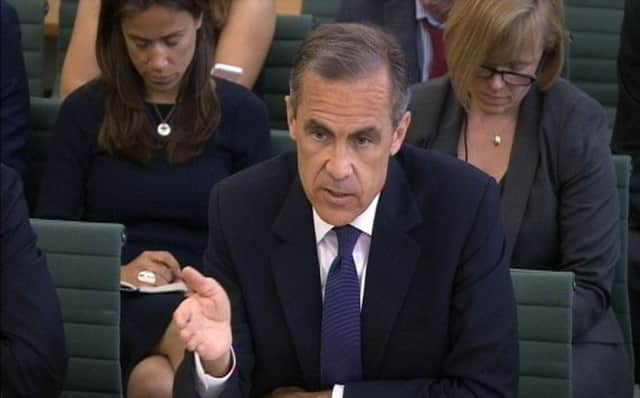Bank governor grilled over ‘unreliable’ guidance


Mark Carney, who recently warned that an increase in borrowing costs could come “sooner than markets currently expect”, has now played down the prospect of an early rate hike.
During his appearance in front of MPs of the Treasury select committee, Carney was told by chairman Andrew Tyrie that he had given “quite a lot of guidance, not all of it seeming to point in the same direction” since becoming governor of the Bank in July last year.
Advertisement
Hide AdAdvertisement
Hide AdLabour MP Pat McFadden weighed in: “It strikes me the Bank is behaving a bit like an unreliable boyfriend – one day hot, one day cold – and the people on the other side of the message are left not really knowing where they stand.”
Carney rejected the allegation, claiming that the Bank had been “absolutely consistent” in saying that any rise in interest rates would be driven by the economy’s performance, and would be “limited and gradual”.
His previous comment, during his Mansion House speech on 12 June, that rates may start to rise earlier than markets anticipate had led many observers to speculate that a move as could come as early as this autumn.
But Carney told MPs that the intention of his earlier comment had been to shake markets out of their mindset that monetary tightening might be delayed for some time, and that they should be reacting to emerging economic data.
The latter has included a sharp fall in unemployment and a house price boom. Carney told the committee that there now seemed to be more spare capacity in the labour market than previously thought.
Although the recovery had taken hold and business investment was rising, he said earnings growth was not as strong as expected, suggesting the economy could grow more without triggering inflation.
“The best collective judgment of the monetary policy committee (MPC), which I share, is that there is additional spare capacity in the labour market that can be absorbed further before we would begin to raise interest rates,” the governor added.
UK interest rates were slashed from 5.75 per cent to their current 0.5 per cent in the 2008-9 recession. While this has been good news for mortgage-payers and businesses, it has slashed returns on depositors’ savings.
Advertisement
Hide AdAdvertisement
Hide AdHowever, Carney told MPs that even when rates start rising they are likely to be “materially below the 5 per cent historic average” until at least 2017.
Chris Williams, of consumer advisory service Wealth Horizon, said: “Despite its protestations, the Bank of England has significantly overestimated the level of clarity that the market and consumers have on its strategy around interest rates.”
Tyrie said after the committee meeting: “In the space of a few minutes, the governor confirmed that his remarks on interest rates at the Mansion House both reflected his personal views and commanded the unanimous support of the MPC.”
He said greater clarity was called for on whether Carney’s future comments were his own views or reflected the MPC’s views.